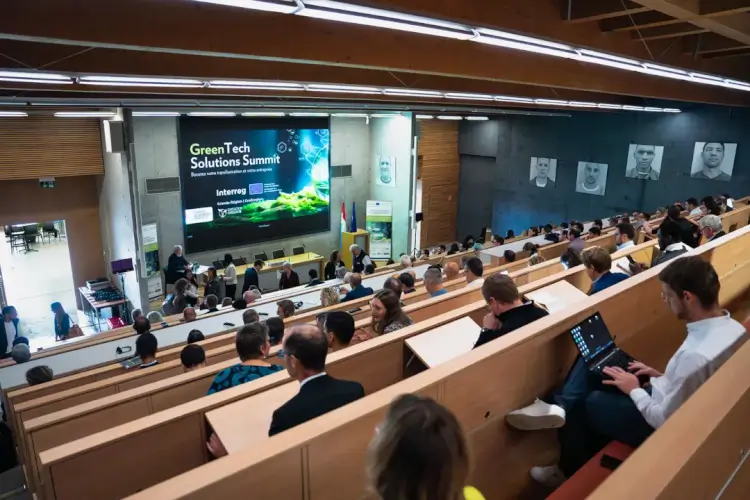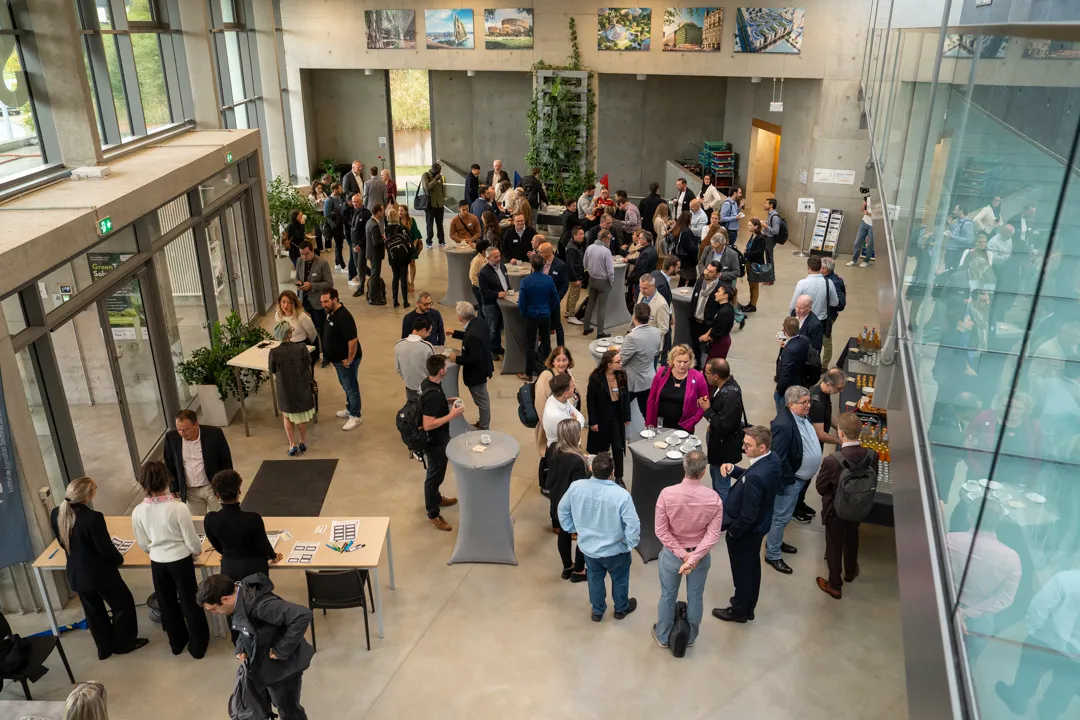


The European project aimed at implementing an accelerator of the ecological transition within the Greater Region was officially launched on 26 September.
 Jean-Michel Gaudron
Jean-Michel Gaudron
 The European Greater Green+ project was officially launched at the GreenTech Solutions Summit, held at the Building Sector Training Institute (IFSB) in Bettembourg on 26 September, with more than 200 attendees.
The European Greater Green+ project was officially launched at the GreenTech Solutions Summit, held at the Building Sector Training Institute (IFSB) in Bettembourg on 26 September, with more than 200 attendees.
Supported by the European Union’s European Regional Development Fund (ERDF), through the Interreg Greater Region 2021-2027 programme, the Greater Green+ project aims to make the Greater Region a leading territory in the ecological transition in the service of the circular economy and sustainable development.
This project, which is structured around five themes (energy; sustainable construction and renovation; recycling technologies; water and environment; bioeconomy), has a budget of €6.5 million by 2028, mobilising 11 financial partners and 19 methodological partners. It aims in particular to create a platform dedicated to greentechs, with the valuable support of Luxinnovation, which will provide its sectoral mapping tools developed for Luxembourg to serve as a basis for this initiative.
"The presence of a large number of representatives from the four countries of the Greater Region at this event alone shows the spirit of collaboration and sharing that drives this Interreg project," said Sasha Baillie, CEO of Luxinnovation. "The implementation of this platform, supported by all the partners, will help the completion of collaborative projects and/or cross-border technology transfers, as well as the structuring of these projects." She recalled that the mapping of sustainability facilitators created by Luxinnovation almost two years ago served as a source of inspiration for this model.
Greentech startups and SMEs need targeted support to grow and reach a scale that can have a real impact. Saha Baillie, Luxinnovation
The challenges of the development of greentechs go beyond environmental issues alone, Ms Baillie underlined. "They touch on economic and social transformation, as green innovation represents a rapidly expanding sector that offers significant economic opportunities, creates jobs and boosts local economies. To do this, greentech startups and SMEs need targeted support to develop and reach a scale that can have a real impact. This is the challenge of a project such as Greater Green+.”
"As soon as the Greater Green project was completed in 2020, we had the idea of presenting a more ambitious and structuring extension, in order to put in place what could not be implemented at the time. We have maintained this good momentum," explained Bertrand Simon, head of European projects at the Grand E-Nov+ international innovation and prospecting agency in the Grand Est (France). "We aim to set up a support ecosystem in the different territories to accelerate the ecological transition and economic resilience through the development of greentech for the circular economy."
The expected benefits of this project are numerous. Jacques Thill, Ministry of the Economy, SMEs, Energy and Tourism
 The ambitious objective is to reference 800 solutions on the future platform dedicated to greentechs, to collect around thirty ideas for collaborative projects and to initiate a dozen, "benefiting from opportunities for cross-border/European technological and/or commercial collaborations", as Alexandre Folmer, Greater Green+ project manager at Grand E-Nov+, recalled.
The ambitious objective is to reference 800 solutions on the future platform dedicated to greentechs, to collect around thirty ideas for collaborative projects and to initiate a dozen, "benefiting from opportunities for cross-border/European technological and/or commercial collaborations", as Alexandre Folmer, Greater Green+ project manager at Grand E-Nov+, recalled.
"The expected benefits of this project are numerous," explained Jacques Thill, Coordinator of Digital Economy and Data Policy at the Ministry of the Economy, SMEs, Energy and Tourism. "It will promote the emergence of collaborative projects on common issues in these key areas, while strengthening networking between companies, research centres and institutions. It will also generate innovative cross-border collaborations and improve access to environmental technologies for companies and regions."
The establishment of an inter-regional knowledge base and an increase in the visibility of greentech solutions, both locally and internationally, are also among the stated objectives of this initiative. "In Luxembourg, this project will have a significant impact by promoting the circulation of information, intensified networking, and the development of local businesses," underlined Mr Thill.
Together we can achieve results across borders and experience a greener Europe. Michael Hauer, Ministry of Climate Action, Environment, Energy and Mobility of the state of Rhineland-Palatinate
The cross-border dimension of the Greater Green+ project was at the heart of all discussions and exchanges at this conference. "Let's work hand in hand. Together we can achieve results across borders and experience a greener Europe," insisted Michael Hauer, State Secretary at the Ministry of Climate Action, Environment, Energy and Mobility of the state of Rhineland-Palatinate. "The 30 project partners are the pillars of this ambitious programme. This is not a project but a marathon. The conditions of climate change require concerted action and strong partnerships. We cannot create this infrastructure alone or implement this project alone."
The financial stakes are high in view of the figures put forward by Mr Hauser: according to the reinsurance group Munich RE, one of the largest in the world, more than 90% of the damage linked to climate change is currently uninsured at the global level.
The Greater Green+ project not only responds to current challenges, but also anticipates future challenges to better respond to the climate crisis. This was highlighted by Juliane Fromm, in charge of cross-border affairs and Interreg projects at the Luxembourg Ministry of Energy and Spatial Planning. "This is not a project for today, but for future generations, children and grandchildren who will live in a Greater Region that is greener, more prosperous and cleaner. Each region and territory has a crucial role to play in this fight against global warming."
Borders are not barriers, but become bridges to the ecological transition. Juliane Fromm, Luxembourg Ministry of Energy and Spatial Planning
In her eyes, within a unique territory such as the Greater Region, borders are not barriers, "but become bridges to the essential ecological transition. You now have a unique opportunity to contribute to this transition and to set up a model of collaboration that other territories can learn from in the future."
Until 13 November, the second "call for small projects" (for small structures with an idea for citizen and cross-border action) is open, pending the large-scale launch on 4 November of the 3rd "call for classic projects" (which implement cross-border actions whose benefits to the programme's cooperation territory) which will run until 20 December 2024.